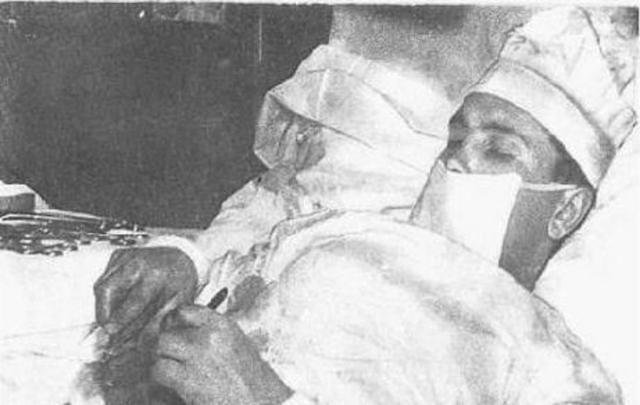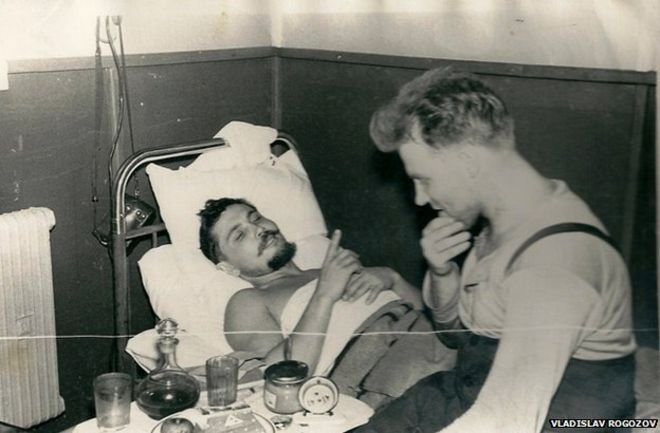
In 1961, during an expedition to Antarctica, the Russian surgeon Leonid Rógozov became seriously ill. He needed surgery, and being the only doctor on the team, he realized that he would have to do it himself.
In the middle of the polar winter, 27-year-old Leonid Rógozov began to feel tired, weak and nauseated. Later, he began to suffer from severe pain in the right side of his abdomen.
"Being a surgeon, he had no difficulty diagnosing acute appendicitis," says his son Vladislav. "It was a medical condition that had to operate many times, and in the civilized world it is a routine operation." Unfortunately, he was not in the civilized world, but he was in the middle of a polar desert. Explain.
Rogozov was part of the sixth Soviet Antarctic expedition, in which a team of 12 people was sent to build a new base at the Schirmacher Oasis.
The station of Novolazarevskaya was established in the middle of February of 1961, and with the mission finished the group remained in the hostile winter.
The trip from Russia to Antarctica had taken 36 days by sea and the ship would not return until the following year. Flying, moreover, was impossible because of snow and blizzards.
"He faced a very difficult life-or-death situation," says Vladislav. "I could not expect help or attempt to operate on myself. It was not an easy decision. Rogozov knew that his appendix might burst at any moment, and that if that happened he would most likely die. And as he considered his options, his symptoms worsened.
"He had to open his own abdomen to pull out his bowels," says Vladislav. "He did not know if that was humanly possible."

Rogozov made his decision: he was going to perform a self-appendectomy before he died without doing anything. "I could not sleep all night, it hurts like the devil!" A snowstorm hits my soul, groaning like 100 jackals, "he wrote in his diary. "There are still no obvious symptoms of perforation but an oppressive sense of omen hangs over me ... that's all ... I have to think of the only possible way, to operate myself ... It's almost impossible ... but not I can just sit back and give up. "
Rogozov elaborated a detailed plan of how he would develop the operation and assigned specific duties and tasks to his assistants
The use of general anesthesia was out of the question. Rogozov was able to administer a local anesthetic to his abdominal wall, but once he had made the incision, the appendix would have to be removed without further anesthesia in order to keep the head as clear as possible.
"I was scared, but when I took the needle with the novocaine and put the first injection, somehow I went into surgery, and from that moment on I did not notice anything else." Rogozov intended to use the mirror to help himself operate but found the inverted view more of an obstacle, so he ended up working to the touch, without gloves. Upon reaching the final and most difficult part of the operation, he almost lost consciousness. He began to fear that he would fail at the last stretch. "The bleeding was quite heavy, but I took my time ... When I opened the peritoneum, I damaged the intestine and I had to sew it," Rogozov wrote. "I was getting weaker and weaker, my head began to spin. Every four or five minutes I was resting for 20 or 25 seconds.
"Finally here is the damned appendix!" With horror I noticed the dark stain at its base, which means that one more day and would have burst ... My heart reacted and slowed noticeably, my hands looked like rubber.Well, Is going to end badly and the only thing that is going to remain is an appendix extirpated ".
But it did not fail. After nearly two hours he had completed the operation, to the last stitch. Then, before he allowed himself to rest, he instructed his assistants on how to wash the surgical instruments and only when the room was clean and tidy did he take the antibiotics and the sleeping pills. It was an amazing achievement. "The most important thing was that he was relieved because he had another chance to live," says Vladislav. Rogozov returned to his normal duties only two weeks later.

CREDITS
Excellent
Wow that's an amazing story. Amazing and nauseating at the same time. Thanks for sharing!
hahaha i know!!! D=